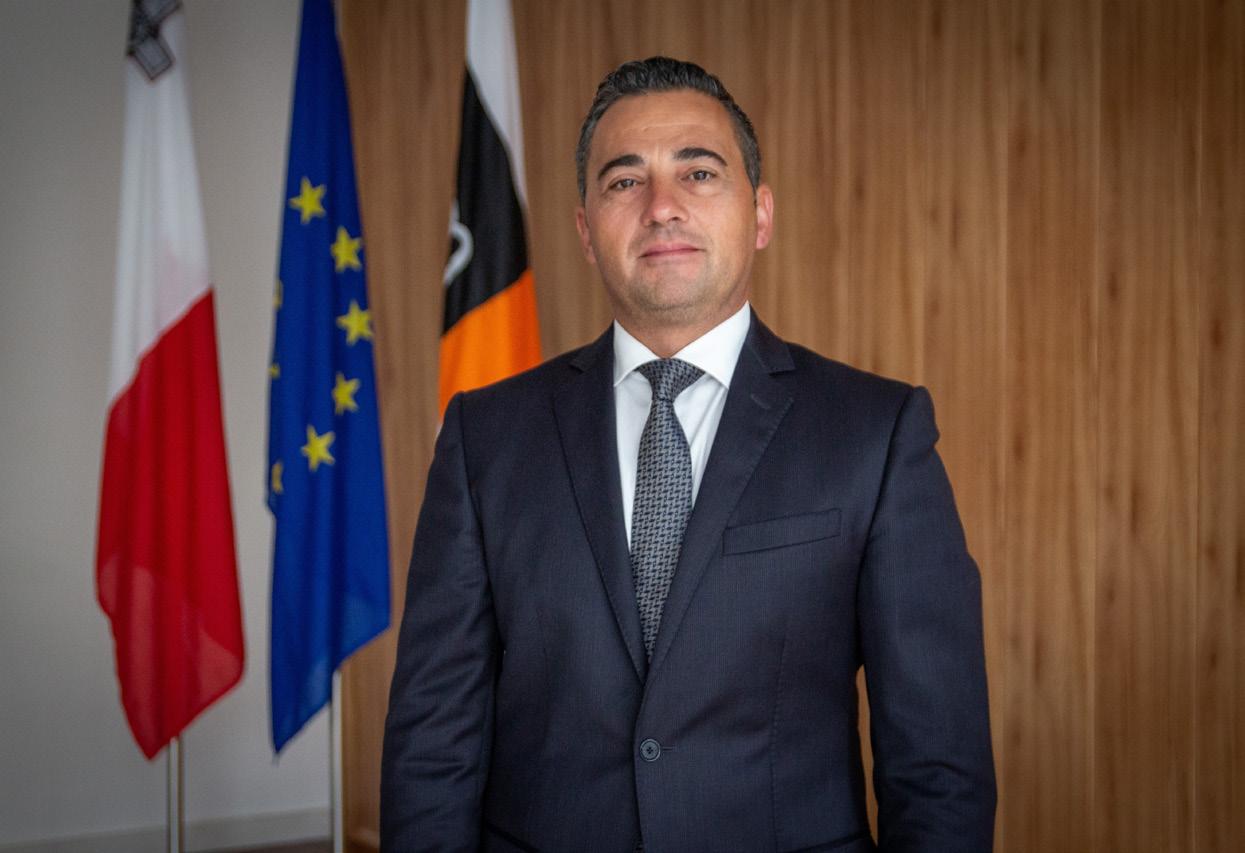
5 minute read
Executive Summary
Joseph Bugeja Chairman & CEO
Merchant Shipping Directorate
Advertisement
As of the end of December 2020, the number of ships registered under the Merchant Shipping Act was 8,807, for a total gross tonnage of 84.27 million. This represents a growth rate of around 2.48% over the previous year, with Malta maintaining its position as the largest register in Europe and the sixth largest in the world in terms of gross tonnage. The Directorate has also further strengthened its presence in the superyacht sector. Positive results were once again achieved in the registration of superyachts under the Malta flag. In 2020, the Malta flag registered an increase of over 6.6% over the previous year in the registration of superyachts over 24 metres in length under the Merchant Shipping Act, with almost 860 superyachts flying the Malta flag.
Ports and Yachting Directorate
The COVID‑19 pandemic has also left its impact on port business, and this resulted in a decrease in marine traffic, particularly within the Grand Harbour. This is mainly attributed to a drop in the Cruise and Ferry sector. There was also a decrease in ship calls calling for services such as repairs and bunkering. In actual fact, the total number of cruise passengers visiting the Maltese Islands in 2020 went down to just 59,018 from the 908,549 passengers reported the previous year. Also affected were the shipping movements, which in 2020 amounted to 10,695; a decrease of 1,697 movements when compared to the previous year. Another drop was reported in the total number of passengers travelling to and from Malta by Catamaran or RO‑RO in 2020. The number reported, 219,720, is a decrease of 104,250 over the previous year.
In 2020, the Ports and Yachting Directorate was entrusted with the administration of the Port Charges Refund Scheme with an allocated budget of €2.08 Million. The beneficiaries of this scheme included ship operators, import and export agents as well as freight forwarding agents. The scheme was computed on actual ship calls that took place between December 2019 and May 2020. The Directorate, with the support of the Ministry, also supported a number of front‑line maritime service providers including Pilots, Mooring Men and Port Workers, by giving financial assistance for the procurement of PPEs and sanitation equipment. The Directorate also assisted the Health Authorities in developing a protocol to facilitate crew changes via Malta without compromising public safety.
Scheduled liner cargo services with essential goods including food and medical supplies remained consistent with no operational delays or reduction in service. Civil Aviation Directorate
The registration sector has encountered significant growth of more than 150% over the past five (5) years, from the Maltese aircraft register listing over 200 aircraft in 2015 to over 500 aircraft at the end of 2020. The number of Air Operating Certificate (AOC) holders exceeded 40 at the end of the year. Two new Foreign Examination Centres were certified in 2020, together with three new Language Testing Bodies.
Aircraft Leasing Malta was launched during this year, and the compelling reasons to introduce aircraft leasing in Malta include a highly competitive personal and corporate tax framework, an extensive double taxation treaty network, a robust legal system and landscape, and lessor benefits from a friendly legislation. Further to this launch, an online drone management system, tmcad.idronect.com, was also launched, whereby Unmanned Aircraft Systems operators can register and submit flight requests to obtain flight authorisations. An online training course has been launched, as required by EASA, to enable remote pilots to obtain an A1/ A3 certification which also provides examinations for both A1/A3 as well as A2 subcategories.
Due to the outbreak of the COVID‑19 pandemic, the Air Transport Regulation Unit within the Civil Aviation Directorate (CAD) made sure to follow the developments in air transport matters from an International and European perspective, assisted in the coordination process by providing the necessary feedback, and served as a link between airline operators and other Government entities. The Safety and Compliance Unit within CAD was also in constant liaison with the respective CAD inspectorates, EASA counterparts, and operators/organisations under the CAD oversight, in order to ensure that operational safety risks are identified and mitigation measures are put into place.
Land Transport Directorate
The Land Transport Directorate continued its activities as regulator of land transport throughout 2020. As for all other entities, the COVID‑19 pandemic posed some severe challenges to the operations of the Directorate, some of which had to stop temporarily for some weeks when Malta was in a semi‑lockdown situation. The cyber‑attack suffered by Transport Malta’s IT system also had its negative impacts on the Directorate’s activity.
Throughout 2020, Transport Malta extended the range of services available from its offices in Ħal Lija and deployed a new queue management system. Almost all services related to vehicle registration and driver licensing and permitting are now available from both offices. The Directorate’s regulatory unit moved to new dedicated offices in Paola, so that not all the unit’s staff and processes are grouped within the same premises.
Five financial schemes for more sustainable private means of transport were launched, with an investment of €5 million. The Directorate continued its effort to recover licence arrears, bringing closure to 612 cases, with a total recovered revenue of €180,000. The total Government revenue from vehicle registration and licensing increased by €2.9 million from 2019. The e‑Transfer service was also promoted further, with significant increased usage for garaging, de‑garaging and exporting of vehicles.
A total of 11,990 practical driving tests for various categories were processed and carried out, together with hundreds of other more specialized tests. Moreover, 1,312 Customer Care exams, 363 CPC Initial Tests and 1,597 CPC Periodic certifications were conducted. The number of new driving licences issued amounted to 5,527, whilst 29,808 were renewed. Another 15,576 licences were subject to changes, withdrawals, and/or exchanges.
Fifty new buses were introduced, bringing the fleet’s average age to 5.2 years. Whilst the passenger trips in January and February saw an increase of 21% over the same period in 2019, the COVID‑19 pandemic caused an overall decrease of 41% throughout the whole year, during which a total of 33.8 million passenger trips were carried out. The free transport scheme was extended to all persons having at least 75 years of age, with more than 50,000 persons benefitting from 5.7 million free trips. The Tallinja card was held by 420,000 persons with 87% of the total trips paid through this card.
A new taximeter was installed on all taxis in Malta and Gozo, with 13 new vehicles replacing older ones in the fleet. A set of amendments to the Taxi Services Regulations were proposed and approved, representing the second major review of the original 2010 Regulations.
Regulatory control on VRT Stations to ensure safer and cleaner vehicles on our roads was maintained, resulting in 2 testers found in breach of the VRT regulations. They were penalized accordingly, and court procedures started against one station.











